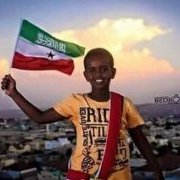Leaderboard
Popular Content
Showing content with the highest reputation on 10/03/2018 in Posts
-
3 pointsWhat control are you taking about my fellow delusional SOLer? Have you even read the comment before bubbling over with non-sense. The only folks who have no control whatsoever of their territory seem to be your lot who are wiggling under the rubber boots of the Ethiopian military forces. Let me tell you what control is and is not: 1. It is an unrivalled authority over a territory including its airspace. Meaning anything which happens to the aircrafts in a territorial airspace is the responsibility of those in charge. Now tell me who is in charge of Somaliland? 2. It is the ability to have a complete access to a territory where an aircraft makes emergency landing or crash lands to carry out recovery and full investigation. Tell me who has such an access to Somaliland? 3. It is not just sitting idly in front of a commuter screen in an office with UN staff and watching airlines go about their business. I can do that with my mobile phone. If you claim to have control over an airspace then you have declared that you have an unfettered access to the territory under such airspace so assume responsibility for anything which happens to the airlines in the air and on the ground.
-
2 pointsYour an amisom protectorate and some south African fellow represents you on the international stage. The entire south central Somalia is in the hands of alshabaab jihadists. Dowladnimoy xaal qaado. Waxani wa maqaarsaar dowlad maha. Wa wax la so nabnabay. Isu keen keen baad tahay gabigaaguba. Adiguna lacagta ayaad ngoyar ku shubata deedna Kenya ayaad ku cunta. Qaraxu iyo dhimashadu na wa halkeedi waku caadi. Maafish caqli thalatheen sannah.
-
2 pointsThat's the point there Is no authority in Mogadishu it's been 11 years since the amisom came and you are still where you were in 1991. Don't be fooled by the small sadaqa US gives or the Qatari ikwaani funds. You and your clan are nothing but furniture stealers iyo anarchists and Ethiopia and Kenya both have their troops inside your supposed territory. And there is nothing you can do about because they have the approval from Washington and Brussels. Let me tell you a secret there is no sovereignty today Ethiopia has the power to arrest kheyre and Farmaajo. And there is nothing you can do about it. Adeer isma ogid wax Somalia layidha maanta majirto. It ceased to exist long time ago.
-
2 pointsDoes the wretched secessionist's impotency and pipe dream surprise you? Not to me, though. From dowladda dhexe doesn't control Waqooyi airspace to this. At least he is finally realizing the reality. Muqdisho iyo Hargeysa are both Soomaali cities in Soomaaliya. There is no hostility between the two or its residents. Only a small, dying breed of miserable secessionists have hatred for Muqdisho and to its residents.
-
1 pointThere is no such thing as an sfg it's a western backed govt in hiding. It controls zero districts. Somalia had no government since the communist dictator was removed from power in 1991. You need 30.000 African union troops to keep your head on your body. I am not impressed Turks do some construction the Europeans pay your bill. And Uganda and Burundi and the Ethiopians protect you.
-
1 pointExcellent news reer jirde xuseyn one of the autocratic families of Somaliland. They started their bussines from berbera than to old Somali republic xamar even as far as other regions in south central Somalia. I know jirde grandson baasha very bright fellow lives in Kenya. Highly educated. This project is nice we need more of these projects so that the people of Somaliland especially the youth can get opportunity jobs.
-
1 pointLong before Winston Tubman, François Fall, before Mahiiga, before Walad Cabdalle, before Nicholas Kay -- there was Maxamed Saxnuuni. Maxamed Saxnuuni waa ergeygii Qaramada Midoobay u qaabilsanaa arrimaha Soomaaliya sanadkii 1992, waa xiligii Soomaaliya iyo Soomaalidaba marxalad adag ku jireen. Wuxuuna ahaa ergeygii ugu wanaagsanaa, ugu daacadsanaa ergooyinkii Qaramada Midoobay u soo magacoowday Soomaaliya ilaa iyo hadda. Boqolaal kun oo kale Soomaali ayaa macaluul u dhiman lahaa Eebbe ka sakoow haddeenan jirin dadaalkiisa ergeygaan. A profile of his tireless efforts in 1992 from New York Times. __________________________ Mohammed Sahnoun; A Diplomat Matches Wits With Chaos in Somalia Trying to achieve humanitarian, military and political goals in the chaos of Somalia, with its deep clan fissures, lawlessness, horrifying famine and hostile desert environment, might seem an impossible task for a diplomat from the outside. But Mohammed Sahnoun, the senior representative of the United Nations there, is perhaps better suited for the job than most: As an Algerian with an empathy for Africa and as a former ambassador in Bonn, Paris and Washington, he seems to bring to his job a sense both of the desperation in Somalia and of how the wealthier nations of the world might better respond. "The greatest difficulty is we did not try to cope with the situation earlier," said Mr. Sahnoun in a recent interview here, during a pause in his shuttling between Somalia, Kenya and Europe. "The divisions and antagonisms have deepened and have taken on dimensions that are almost inextricable. When you go into a situation where the same family is torn by blood, it's not easy to find a leader to talk to because no leader is totally in control of his troops. When the civil war started there was no attempt from the outside to have reconciliation and now we are left with the law of the jungle." Mr. Sahnoun is the personal representative of the United Nations Secretary General, Boutros Boutros-Ghali, a former Egyptian Foreign Minister who is an old friend from Arab intellectual and political circles. Incensed at the lack of interest in Somalia since civil war broke out in January 1991, the Secretary General lambasted the West over the summer for its fixation on the "rich man's war" in Yugoslavia, a remark that Mr. Sahnoun believes nettled people into paying attention. But now that some of the spotlight is on Somalia -- with foreign ministers and development ministers and heads of humanitarian agencies in safari suits and flak jackets making their requisite visits to show the audiences back home -- Mr. Sahnoun finds himself arguing against outside efforts to force a solution in a place where politics, and emotions, can be extraordinarily parochial. A Need to Talk and Talk "If you try to force something on the Somalis, they think it is humiliation. Like all pastoral people they have had to deal with a hostile environment. They are very tough and they suspect very much. They don't like to be humiliated. But if you talk, negotiate -- it may take days and weeks -- they will go with you." It took weeks, in fact, for Mr. Sahnoun to convince the most implacable warlord, Gen. Mohammed Farah Aidid, that it would be a good idea to allow 500 United Nations troops to protect the Mogadishu port and airport, and to allow humanitarian deliveries within the city. "In the beginning, most Somali movements were against the United Nations," Mr. Sahnoun said. "They saw it as a way of supporting Ali Mahdi." Mr. Ali Mahdi is the so-called interim President of Somalia, and Mr. Sahnoun said his opponents are "still suspicious of the United Nations because Mahdi's Government is seated at the Organization of African Unity, the United Nations and the Arab League but he doesn't control one quarter of the country." Of course, Mr. Ali Mahdi was all in favor of the troops, so much so that he called for 10,000. "I went over to him one morning and said if you want 500, shut up about 10,000," said Mr. Sahnoun. One result is that the first 60 of the 500 arrived in Mogadishu last week, with 2,100 American marines in ships offshore to support the airlift of the troops. The rest of the 500 are to arrive later this month. A slight, rather frail-looking man of 60 with black hair and an air of informality, Mr. Sahnoun is a relentless worker. He often races across the "green line" that divides Mogadishu to sort out a problem with Mr. Ali Mahdi, and he has spent hours sitting on the floor in a house in the bush town of Bardera in central west Somalia with General Aidid, discussing that warlord's ideas of "pastoral democracy" for the country's future. He also ducked into the American Ambassador's house in Nairobi late one night to have a word with a visiting Senator, Nancy Landon Kassebaum, a Kansas Republican, whose itinerary also included Somalia. After serving in Algeria's National Liberation Front in the days of its fight against French colonialism, Mr. Sahnoun started his diplomatic career as deputy secretary general of the Organization for African Unity at its headquarters in Addis Ababa, a post he held for most of the 1960's and into the early 1970's. Then, as Algeria's ambassador to France, he was on the Algerian team that helped negotiate for the release of American hostages from Teheran. In his current job, he must navigate between what he calls the "ivory tower" demands of United Nations officials in New York and the anarchic and violent complexities of Somali politics. And since he is not a career civil servant with the United Nations, he finds himself able to publicly jab the United Nations humanitarian agencies for their slow start in Somalia. "It's important that the United Nations learn lessons from Somalia," he said with some passion. "We may have other Somalias in Africa. I keep telling the United Nations people you don't need a new agency for cooperation. "Many people think before you act you must have two or three secretaries and the public relations person. I've been working for these months and I don't have a secretary and I'm using support staff where I find it." A New Chore Mr. Sahnoun's current chore is to try to persuade the Somalis that the Security Council's resolution last month approving the dispatch of 3,000 more United Nations troops to patrol humanitarian supplies in the rural areas is in Somalia's interest. In a not untypical fashion, Mr. Sahnoun suggests wryly, the Security Council made its announcement without consulting anyone in Somalia. And predictably, General Aidid has expressed opposition. "People in Somalia see it as a threat because they feel they are going to lose jobs and work for their trucks," Mr. Sahnoun said. Currently, humanitarian aid is protected from looters by hired gunmen in souped-up jeeps, and often these gunmen themselves turn out to be looters. "If we force in troops without necessary preparation we will have renewed fighting," Mr. Sahnoun said. "Instead of peace we may be bringing in fighting, which would be terrible. I am going to explain that these are only projections, which is true because we don't have their consent. I prefer the homeopathic method -- to get people to accept naturally."
-
1 pointThe boosaneero-living, sewage-dwelling creature's stench stains a thread honouring a great man.
-
1 pointI made this thread some four and half years ago honouring Maxamed Saxnuuni. I learned the passing of this great man a few days ago. Eebbe janadiisa fardowso haka waraabiyo Maxamed Saxnuuni, who passed away in Faransiiska 11 days ago. He is unacknowledged hero to Soomaalis, though jiilkaan cusub ma oga how this Aljeeriyaan brother really tried to save Soomaaliya from a complete catastrophe in early '90s. Unfortunately, his worries came to pass. I remember his tireless efforts in 1992, trying hard by shuttling between Caydiid and Cali Mahdi to come to the table and make a permanent peace in Muqdisho. Unfortunately, they didn't listen and, as they say, the rest is history. He wrote books about his efforts in Soomaaliya.
-
Newsletter





